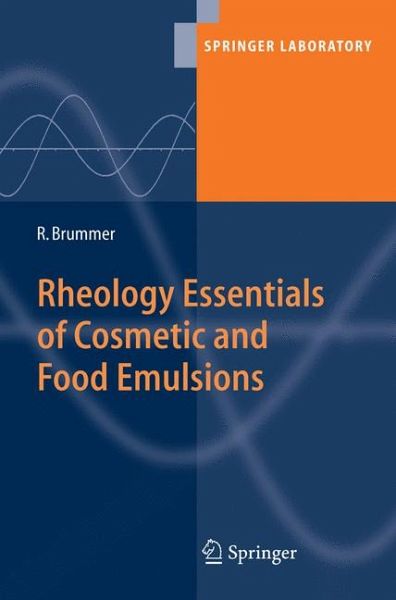
Rheology Essentials of Cosmetic and Food Emulsions (eBook, PDF)
Versandkostenfrei!
Sofort per Download lieferbar
64,95 €
inkl. MwSt.
Weitere Ausgaben:

PAYBACK Punkte
32 °P sammeln!
Cosmetic emulsions exist today in many forms for a wide variety of applications, including face and hand creams for normal, dry or oily skin, body milks and lotions, as well as sun-block products. Keeping track of them and their properties is not always easy despite informative product names or partial names (e.g. hand or face cream) that clearly indicate their use and properties. This practical manual provides a detailed overview that describes the key properties and explains how to measure them using modern techniques. Written by an expert in flows and flow properties, it focuses on the appl...
Cosmetic emulsions exist today in many forms for a wide variety of applications, including face and hand creams for normal, dry or oily skin, body milks and lotions, as well as sun-block products. Keeping track of them and their properties is not always easy despite informative product names or partial names (e.g. hand or face cream) that clearly indicate their use and properties. This practical manual provides a detailed overview that describes the key properties and explains how to measure them using modern techniques. Written by an expert in flows and flow properties, it focuses on the application of rheological (flow) measurements to cosmetic and food emulsions and the correlation of these results with findings from other tests.
Beginning with a brief history of rheology and some fundamental principles, the manual describes in detail the use of modern viscometers and rheometers, including concise explanations of the different available instruments. But the focus remains on practical everyday lab procedures: how to characterize cosmetic and food emulsions with different rheological tests such as temperature, time, stress and strain, both static and dynamic. Also the critical topic of how the results correlate with other important product characteristics, for instance, skin sensation, pumping performance, stability etc. is carefully explored. Many pictures, illustrations, graphs and tables help readers new to the measurement of cosmetic emulsions in their daily work as well as to the more experienced who seek additional special tips and tricks.
Beginning with a brief history of rheology and some fundamental principles, the manual describes in detail the use of modern viscometers and rheometers, including concise explanations of the different available instruments. But the focus remains on practical everyday lab procedures: how to characterize cosmetic and food emulsions with different rheological tests such as temperature, time, stress and strain, both static and dynamic. Also the critical topic of how the results correlate with other important product characteristics, for instance, skin sensation, pumping performance, stability etc. is carefully explored. Many pictures, illustrations, graphs and tables help readers new to the measurement of cosmetic emulsions in their daily work as well as to the more experienced who seek additional special tips and tricks.
Dieser Download kann aus rechtlichen Gründen nur mit Rechnungsadresse in A, B, BG, CY, CZ, D, DK, EW, E, FIN, F, GR, HR, H, IRL, I, LT, L, LR, M, NL, PL, P, R, S, SLO, SK ausgeliefert werden.













